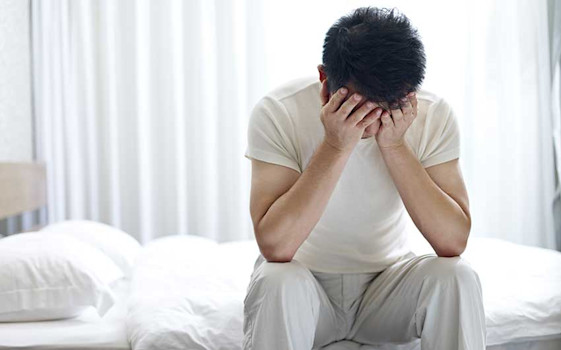Top tips for a better night’s sleep

Author Gill ShafferLast updated 03 July 2020
- Health Conditions
Top tips for a better night’s sleep
Sleep is a significant factor in our lives and something that can cause detrimental effects on our health if we don’t manage it well. Lack of sleep can cause us to feel grumpy or unfocused but continued sleep deprivation can also affect our mental and physical health too.
Heart disease, obesity, diabetes and life expectancy can all be affected when we regularly have inadequate sleep. Sleep is not promoted generally as a health topic, so it’s more difficult for us to stay well informed on the causes and cures for sleep deprivation.
Here are some top tips on how to improve your night’s sleep.
Causes

Despite there being a general consensus on why people experience sleep deprivation, with one in three of us suffering, we are all different regarding the individual reasons. It would be helpful if you could identify what’s affecting you.
In fact, according to a UK study of 8,000 individuals conducted by testing company Health Check, around 70 per cent of participants were found to have low magnesium levels. Symptoms of deficiency include tiredness and fatigue, headaches and trouble sleeping.
- Sleep disorder: These include insomnia, sleep apnea, narcolepsy, and restless legs syndrome.
- Ageing: People older than 65 have trouble sleeping because of medication they’re taking, or medical problems they’re experiencing.
- Illness: Sleep deprivation is common with depression, schizophrenia, chronic pain syndrome, cancer, heart disease, stroke, Parkinson disease, and Alzheimer’s disease.
- Other factors: Many people experience occasional sleep deprivation for other reasons, including stress, a change in routine, or a new baby disrupting their sleep schedule.
Effects
With sleep deprivation becoming increasingly common in society, identifying our individual cause is important, especially with the possible short-term and long-term effects.
NCBI2 says that the possible short-term effects include “increased stress responsivity, somatic pain, reduced quality of life, emotional distress, mood disorders, and cognitive, memory and performance deficits.” As well as the possible long-term effects being “hypertension, dyslipidemia, cardiovascular disease, weight-related issues, metabolic syndrome, type 2 diabetes mellitus, and colorectal cancer.” These ailments can be managed through improved sleep.
We often push off sleep, thinking it is not as critical as what we’re working on. However, the positive effects of sleep far outweigh whatever is keeping you up at night. For instance, NHS3 lists sleep being able to “boot immunity, boost mental wellbeing, prevent diabetes, increase sex drive, ward off heart disease, increase fertility,” and even keep you slim.
Symptoms
Some sleepless nights may cause a lack of focus and some cognitive function issues, but as time goes on, your symptoms can become worse and even life-threatening.
Columbia University's Neurology Centre4 also specifies the symptoms from initial sleep deprivation to the complications that can occur over time. These include:
Short time frame sleep deprivation
- Drowsiness
- Inability to concentrate
- Impaired memory
- Reduced physical strength
- Diminished ability to fight off infections
Long time frame sleep deprivation
- Increased risk for depression and mental illness
- Increased risk for stroke, heart disease and asthma attack
- Increased risk for potentially life-threatening complications, like car accidents and untreated sleep disorders like insomnia, sleep apnea, and narcolepsy
- Hallucinations
- Severe mood swings
It’s often difficult for us to put into perspective how much sleep can be detrimental to our health. If you are feeling the following symptoms and can acknowledge that it’s, in fact, through lack of sleep, finding the help you need will be imperative to your health.
Treatments

Just like the short and long-term symptoms of sleep deprivation, there are short and long-term treatments as well. The Sleep Foundation5 clarifies some great self-taught or assisted help techniques.
Relaxation Training: Multiple relaxation systems have been used in various countries and in many different practices. These include, but are not limited to, deep breathing exercises, meditation and/or guided imagery. One that many may not have heard of is the progressive muscle relaxation technique which “helps to calm the body and induce sleep.”Essentially, you are tensing and relaxing different muscles in your body to force yourself into relaxation.
Don’t worry if you struggle to stay focused, there are plenty of audio guides and apps to support you with your sleep treatment journey.
Stimulus control: is a practice in which you train yourself to associate your bedroom with sleep and nothing more. For instance, continuing in the same rhythm of sleep times and wake times, going to bed only when you are sleepy and only getting out of bed after twenty minutes of being awake.
Cognitive-behavioural therapy (CBT): as mentioned before, this technique also includes that of stimulus control as well as adding the “thinking component” to your sleep time. Sleep Foundation states that “CBT works to challenge unhealthy beliefs and fears around sleep and teach rational, positive thinking.”
Medical Treatments: as there are plenty of over the counter sleeping aids offered, you most likely will be able to find one that works best for you. However, it’s important to consult your doctor beforehand as many medications have different ingredients that can cause drowsiness or other negative effects.
Natural remedies: if you want to stay away from chemical-based medications, there are some additional natural remedies available for you.
- Magnesium:The National Sleep Foundation states that “magnesium increases the neurotransmitter GABA in the brain, which is responsible for slowing your thinking down and helping you fall asleep.”
- Melatonin: melatonin is naturally made in the pineal gland in the brain and can aid in sleep. However, depending on your lifestyle, the melatonin in your brain can be altered by light. Therefore, taking melatonin can encourage you to become sleepy before bed despite the time of day.
- Chamomile Tea: Many people use chamomile tea as a sleep aid. NCBI6states that “traditionally, chamomile preparations such as tea and essential oil aromatherapy have been used to treat insomnia and to induce sedation (calming effects). Chamomile is widely regarded as a mild tranquiliser and sleep-inducer. Sedative effects may be due to the flavonoid, apigenin that binds to benzodiazepine receptors in the brain.”
Our diets can also be a huge factor when it comes to sleep. What we eat and when we eat it can have negative effects on our energy levels and moods. For instance, drinking caffeinated drinks and eating too much food late at night can cause sleep disturbances.
A study by NCBI7 found that “food intake near the sleeping period (dinner and late-night snack) was negatively associated with sleep quality variables.”When we consume anything caffeinated, eat refined carbohydrates or high sugar foods before bed, we mess with our digestive systems and our sugar levels which, in turn, damage our sleep. A nutritious diet is important as well as leaving a few hours before bed for your stomach to digest its last meal.
With a lack of sleep having so many negative effects on our bodies and minds, it’s important to identify what is causing sleep deprivation for you. With there being plenty of treatments and outside aids to support you along your way, you’ll be able to get some good z’s faster than you may believe.
References
- Colombia Universities Neurology Center: Sleep Deprivation
- NCBI short and long term health consequences of sleep disruption: Nat Sci Sleep. 2017; 9: 151–161. online 2017 May 19. 10.2147/NSS.S134864
- NHS Why lack of sleep is bad for your health.
- Columbia University's Neurology Centre Sleep Deprivation
- The Sleep Foundation Treatments
- NCBI Chamomile: A herbal medicine of the past with bright future
- NCBI: Relationship between Food Intake and Sleep Pattern in Healthy Individuals
